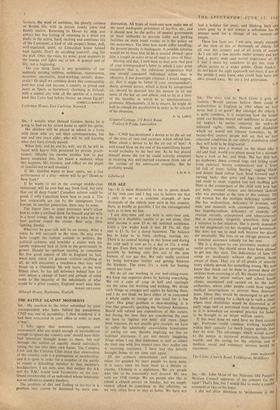Sta,—I wonder what Donald Gordon thinks he is going to
find on his return home to uplift his spirits.
His children will be placed in school in a form with those who are not their contemporaries, but one and two years older, who will be still learning what they have already passed.
When they, and he and his wife, are ill, he will be faced with heavy bills presented by private practi- tioners. (Maybe his income .enables him to pay heavy insurance fees, but pause a moment, when this happens, Mr. Gordon, and reflect on the plight of families not so well situated.)
If Mr. Gordon wants to hear opera, see a live performance of a play—where will he go? Down to New York?
If he wants to eat in the average middle-class restaurant, will he ever find any fresh food, but only that out of deep freeze? Canadian salmon could he good, if only Canadians knew how to cook it. The best restaurants are run by the immigrants from Europe. In another generation, there may be none.
The liquor laws in some provinces won't allow him to order a civilised drink for himself and his wife in a hotel lounge. He may be able to take her to a beer parlour round the corner. Beer only. Dim lighting. Sordid.
Wherever he goes talk will be, on money. After a while he will succnmb to the virus. He may even have caught the /cynical attitude to politics, the• political sickness, and bewilder a visitor with his openly expressed lack of faith in the government in power. Should he—perhaps starting to remember the few good aspects of life in England he had, when here, taken for granted—criticise anything at all, he will encounter a touchiness that may well break up a friendship. He will learn, in the next fifteen years, he has left tolerance behind him for ever, unless a change of heart and attitude of mind come to the majority of the inhabitants of what could be a great country. England won't miss him.
Alburgh House, Harleston, Norfolk
SUSAN CULLESPJE


































 Previous page
Previous page